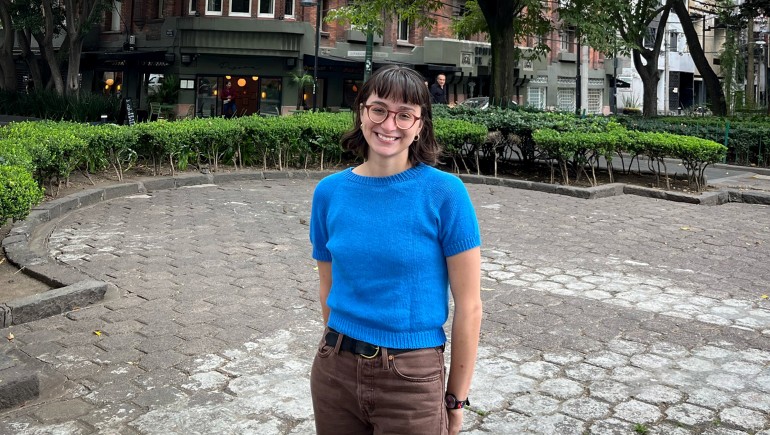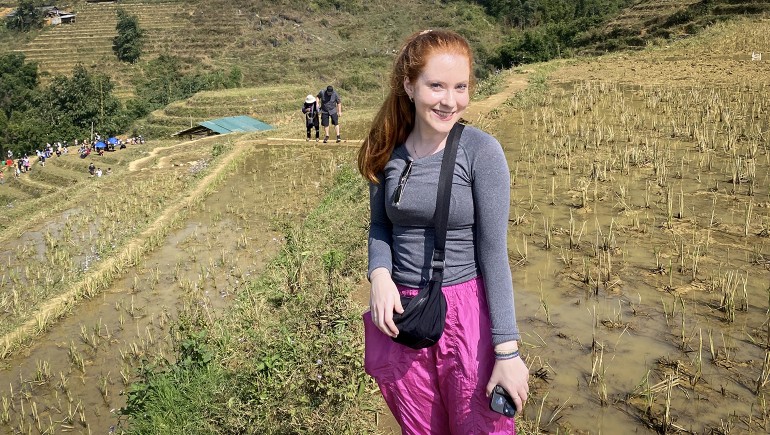Northwestern Named Top Fulbright Producing Institution for 20th Consecutive Year
Northwestern has been named a Fulbright Top Producing Institution by the U.S. Department of State for the 20th consecutive year. Thirty Northwestern students and alumni received Fulbright awards for the 2023-2024 academic year, allowing them to teach, study and research everywhere from Taiwan to Colombia.
“Northwestern’s continued status as a Fulbright Top Producing Institution is a testament to the past two decades of outstanding academic work. It also reinforces the consistent ability of our students and alumni to make exceptional and lasting impacts around the world,” President Michael Schill said.
Established in 1946, the Fulbright U.S. Student Program allows graduating college seniors, graduate students and young professionals to pursue graduate study, conduct research or teach English abroad in one of more than 140 partner countries. Northwestern has made the list of top Fulbright producers since the list’s inception in 2005. In that period, more than 400 Northwestern students and alumni have received Fulbrights.
This year, Northwestern is tied for fourth among top Fulbright student-producing doctoral institutions.
“The Fulbright Student Program offers the perfect opportunity to showcase Wildcat excellence,” said Elizabeth Lewis Pardoe, director of the Office of Fellowships, which administers the Fulbright Student competition for the University.
Graduating seniors, alumni and graduate students with U.S. passports are eligible to apply for awards that last an academic year. The campus application deadline is early September.
“Northwestern’s interdisciplinary ecosystem of humanists, scientists, performers and professionals cultivates Fulbrighters ready to contribute their varied talents from Iceland to Indonesia and Senegal to Slovenia,” Pardoe said. “Our outstanding Fulbright Program Advisors, Stephen Hill and Amy Kehoe, assemble faculty and staff partners from across Northwestern to support our applicants in a multi-stage process that demands months of planning to deploy skills acquired over years of study around the world.”
Northwestern Now caught up with three Fulbrighters currently abroad to learn more about their experiences.
Teaching English in Mexico and Vietnam
Since late August, Ella Bartt, ’23, has been teaching English at a high school in Tlaquepaque, part of the Guadalajara metropolitan area in the Mexican state of Jalisco. There, she uses the knowledge she gained as a Spanish major at Northwestern to help students build language skills and learn about American culture through classes, tutoring and a conversation club.
Going to Mexico had long been a goal for Bartt, who has family history in the country and spent extensive time researching Mexican art movements from the early 20th century during her undergraduate career. She has continued to embrace her interest in Mexican art through a ceramics class at a local cultural center.
Bartt also enjoys going out to eat at local restaurants and traveling, taking advantage of the opportunity to visit places like Chichén Itzá and beaches in Oaxaca.
She said she’s been struck by the hospitality she’s experienced, from the people she’s met at the high school and cultural center to waitresses at her favorite taquerias. “There is a real sense of community and people caring for each other and even people at the corner store who are like, ‘Oh, hey, we haven’t seen you in a while,’” Bartt said.
Thousands of miles away, Sophi Pennex, ’23, is spending her Fulbright at a high school in Vietnam’s Central Highlands. Pennex tells her students to think of her as their “English cheerleader” and focuses on creating a low-stress environment where they can practice their English. She also tries to incorporate fun interactive activities like role-playing a post-game interview or playing a version of the popular game Wordle that she created for the classroom.
Her role has renewed the passion for education that she inherited from her father, a longtime elementary school principal. Building relationships with her students and watching their confidence blossom has been a highlight of the program for Pennex.
“I’m able to be, for some of my students, the person I needed in high school,” she said.
In her free time, Pennex has picked up badminton, which is extremely popular in the country. She admits that when she arrived, she was “awful” at the sport. Now, she plays three times a week with teachers from her school and other members of the community. One of the school’s PE teachers has become her badminton trainer. These relationships have given Pennex a chance to work on her Vietnamese but also shown her how relationships can supersede language barriers.
“[My Fulbright] has changed my perspective on relationships and shown me that you can have connections and have these really lovely experiences in ways that you never thought would be possible without a common language,” she said.
Researching climate and community in Ecuador
Robinson Markus, ’19, is investigating the intersection of housing, climate change and inequality in Quito, the Andean capital city of Ecuador. It’s Markus’ second research trip to the country — they first traveled there for their political science honors thesis during their undergraduate career at Northwestern. Now, he’s examining a government program offering a relocation subsidy to residents of neighborhoods deemed susceptible to climate-related risks like landslides and urban flooding. In partnership with FLACSO Ecuador and the Instituto de Investigaciones de la Ciudad (Quito Metropolitan Research Institute), Markus is hoping to find out what motivates residents to move or stay and how the choice affects residents’ climate vulnerability.
It’s an important subject not just for Ecuadorians, but for people all over the world.
“Whether it’s rising sea levels or wildfires or urban flooding, different cities are going to be increasingly facing climate risks, so we’ll need to figure out how to respond to those risks,” Markus said. “I’m particularly interested in the different perspectives that marginalized residents who are most directly susceptible to environmental risks may have.”
Outside their research, Markus has enjoyed getting to know their peer cohort, rock climbing and picking up local slang. The most rewarding part of his experience thus far has been interacting with Ecuadorians, whether through his research or local climbing gym.
“I’m a real believer that being outside of the country and being in different parts of the world changes your perspective and opens you up to different ways of thinking, not just as a researcher, but as a human,” they said.



